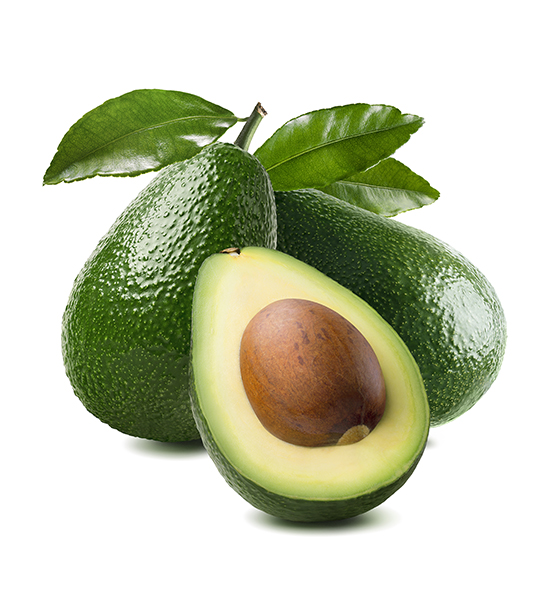AVOCADO
Fresh avocados (Persea americana) are characterised by their high lipid level (or fatty substances) of 14% on average and by a wide variability in its composition (depending on seasons, varieties, origin) with a water level varying from 59 to 85%, and a lipid content from 39 to 7%. The avocado has no cholesterol. But there are however traces of beta-sitosterol, which belongs as cholesterol to the sterols family, but does not have the same metabolism.
The avocado is a fruit generally very well endowed with vitamins:
• The rate of vitamin C is about 11 mg per 100 g
• Pro-vitamin A reaches 0.185 mg per 100 g, with a level comparable to that of peaches and plums
• It contains all the B vitamins, usually at rates 5-10 times as much as most fresh fruits
• It provides a significant amount of vitamin E: 1.85 mg per 100 g, a value much higher than those observed in other fresh fruit (0.1 to 0.6 mg).
The avocado, rich in fat, provides a vast majority of unsaturated fatty acids which are beneficial to cardiovascular health. The avocado is because of its total energy level (on average 138 kcal per 100 g, but sometimes much higher) a preferred food for people whose calorie needs are high (adolescents, athletes, growing children).
Served with a lemon juice and not with a sauce rich in fats the calorie intake can be limited. However, its consumption must still be limited in a low calorie or low fat diet. Due to the nature of its lipids (mostly unsaturated), and the texture of its flesh (very soft when ripe), the avocado remains particularly digestible and well tolerated by most people.
BeFresh offers the following varieties for export: Ettinger, Fuerte, Pinkerton and Hass.
DETAILS
- Weight: per pease – 225-450gr
- Packaging: cartons of 4 kg net
- Recommended storage & transport temperature: 5 °C for Hass, Ettinger and Fuerte and 7 °C for Pinkerton
- Relative Humidity: 90
- Freezing Temperature: -1.6°C
Tags:
AVOCADO

Great
ReplyDelete